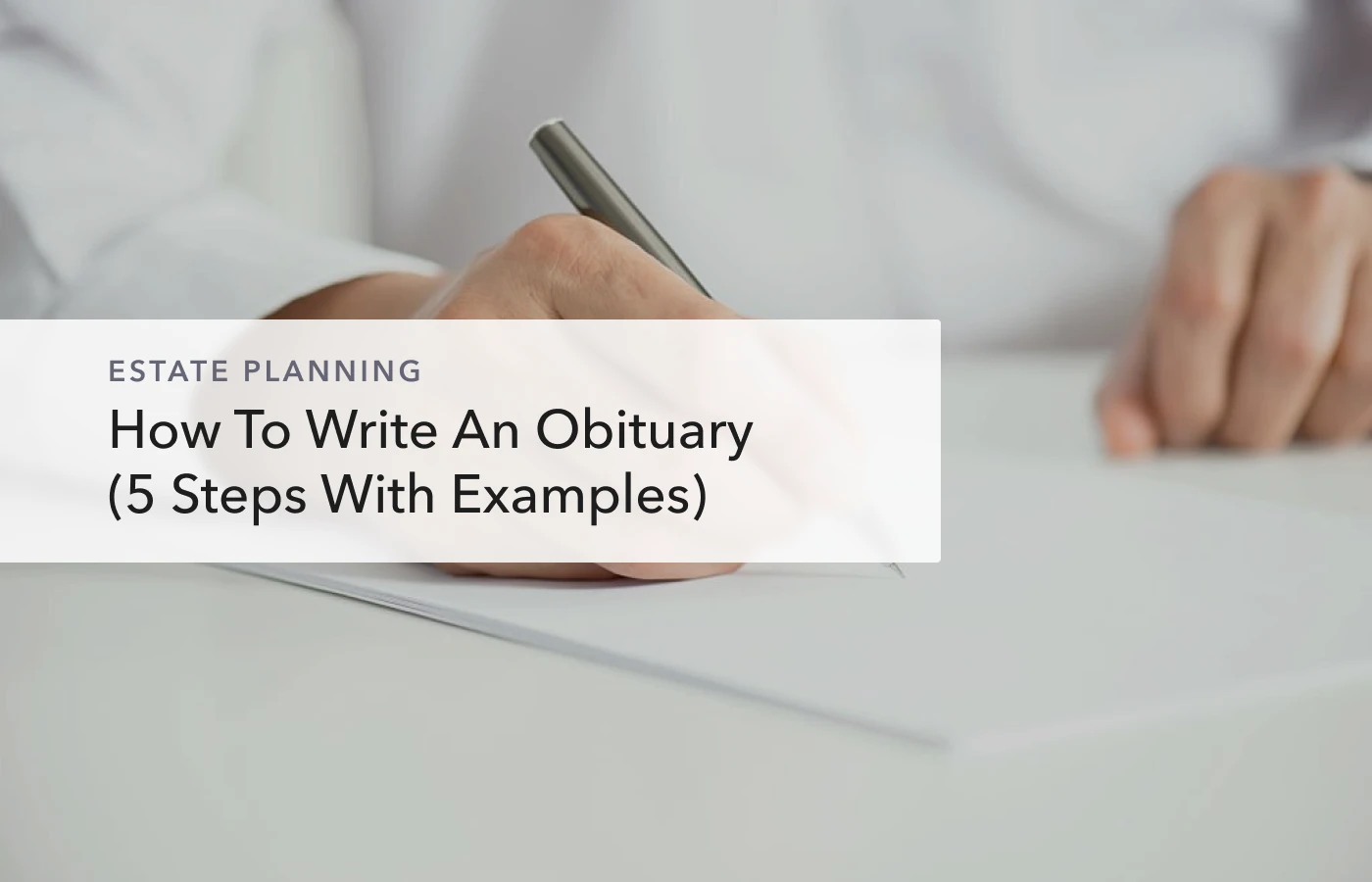Related Articles
Apr 19, 2024
Removing a Deceased Spouse from a Deed: 5 Necessary Steps
Apr 17, 2024
After Death: Can a Spouse Change the Deceased's Will?
Apr 17, 2024
Divorced Spouse's Rights to Property After Death Explained
Apr 11, 2024
Navigating Dual Benefits: VA Disability and Social Security
Apr 11, 2024
Veteran Benefit Eligibility: Understanding Denials and Exclusions
Apr 4, 2024
Eligibility for Veteran’s Spouse Benefits: What You Need to Know
Apr 3, 2024
VA Disability Payments: Can They Be Discontinued?
Mar 30, 2024
Veteran Death: Essential Actions and Checklist for Next of Kin
Mar 27, 2024
SLATs in Estate Planning: An Innovative Strategy Explained
Mar 27, 2024
Maximize Your Estate Planning with Survivorship Life Insurance
Mar 23, 2024
VA Benefits Timeline: When They Stop After Death
Mar 20, 2024
Is Estate Planning a Legitimate Business Expense: Unveiling The Truth
Mar 15, 2024
Does Right of Survivorship Trump a Will: Legal Insights
Mar 13, 2024
Palliative Care at Home: Understanding Insurance Coverage
Mar 13, 2024
Navigating Insurance Coverage for Hospice Care A Complete Guide
Mar 9, 2024
Choosing an Estate Planning Attorney: Traits of Excellence
Mar 7, 2024
Can Family Overrule an Advance Directive? What You Need to Know
Mar 7, 2024
Funding Hospice Care in Nursing Homes: Who Bears the Cost?
Mar 5, 2024
Who Can Legally Witness an Advance Directive? Know Your Rights
Mar 5, 2024
Exploring Hospice Care: What’s Not Included?
Mar 5, 2024
Respite Care in Hospice: Providing Relief for Caregivers
Mar 5, 2024
Exploring the Spectrum: Different Types of Advance Directives
Feb 28, 2024
Deciding on Hospice Care: Knowing When It's Time
Feb 27, 2024
Hospice Care Duration: How Long Can It Last?
Feb 27, 2024
Hospice Care Timeline: Estimating How Long to Live
Feb 22, 2024
Doctor-Ordered Hospice Care: When and Why It Happens
Feb 20, 2024
Funeral Planning Timeline: How Long Does it Really Take?
Feb 15, 2024
Writing a Heartfelt Obituary for Your Husband: Inspiring Examples
Feb 14, 2024
Planning Your Funeral: The Best Age To Start
Feb 14, 2024
Crafting a Loving Obituary For Your Son: Meaningful Examples
Jan 18, 2024
Improving Communication Between Caregivers and Doctors
Nov 29, 2023
Can Anyone Get a Copy of a Death Certificate? Who Is Authorized?
Nov 25, 2023
Original Death Certificate vs. Certified Copy: Key Differences And Why They Matter
Nov 25, 2023
How Do You Handle Negative Aspects of the Deceased's Life in a Eulogy?
Nov 25, 2023
Can There Be More Then One Eulogy at a Funeral? Etiquette Explained
Nov 24, 2023
My Dad Died, Can I Get His Retirement Pension?
Nov 24, 2023
How Many Copies of a Death Certificate Should You Get?
Nov 24, 2023
Can a Eulogy Be Funny? Yes, Here Are 10 Respectful but Funny Examples
Nov 24, 2023
How Do You Receive Inheritance Money WITHOUT any issues?
Nov 17, 2023
Who Gets The Tax Refund of A Deceased Person? An Accountant Answers
Nov 17, 2023
How To Start a Eulogy: 15 Heartfelt Examples
Nov 14, 2023
How To Discuss End-of-Life Care With Parents (Simple Guide)
Nov 14, 2023
How To Cancel a Deceased Person's Subscriptions the EASY Way
Nov 8, 2023
What Should You Not Put in a Eulogy (9 Things To Avoid)
Nov 7, 2023
How Are Estates Distributed If There's No Will? A Lawyer Explains Intestate
Nov 6, 2023
Does Microsoft Word Have an Obituary Template?
Nov 6, 2023
How To Post an Obituary on Facebook: A Step-by-Step Guide
Nov 6, 2023
Why Do You Need A Death Certificate For Estate & Probate Process?
Nov 2, 2023
How Do I Correct Errors on a Death Certificate? And, How Long Does It Take?
Nov 2, 2023
12 Steps For Writing a Eulogy For Mom
Nov 2, 2023
12 Steps for Writing a Eulogy for Dad
Nov 1, 2023
Who Does The Obituary When Someone Dies?
Nov 1, 2023
How Late Is Too Late For An Obituary? 6 Steps To Take Today
Nov 1, 2023
How Much Does It Cost To Publish An Obituary? Breaking It Down
Nov 1, 2023
6 Reasons You Need an Obituary (Plus 6 Reasons You Don't)
Oct 30, 2023
Where Do You Post an Obituary: A Step-By-Step Guide
Oct 30, 2023
Obituary vs Death Note: What Are the Key Differences?
Oct 5, 2023
Buying A House With Elderly Parent: 10 Things To Know
Sep 14, 2023
I'm Trapped Caring for Elderly Parents
Oct 5, 2023
401(k) and Minors: Can a Minor be a Beneficiary?
Sep 12, 2023
How to Self-Direct Your 401(k): Take Control of Your Retirement
Aug 3, 2023
The Ultimate Guide to Decluttering and Simplifying Your Home as You Age
Aug 3, 2023
The Essential Guide to Preparing for Retirement
Aug 3, 2023
Estate Planning For Blended Families (Complete Guide)
Aug 3, 2023
Estate Planning For Physicians (Complete Guide)
Jul 14, 2023
Are You Legally Responsible For Your Elderly Parents?
Jun 7, 2023
How To Travel With Elderly Parent: Here's How to Prepare
Jun 6, 2023
Checklist For Moving A Parent To Assisted Living
Jun 6, 2023
How to Set Up A Trust For An Elderly Parent: 6 Easy Steps
Jun 6, 2023
How To Stop Elderly Parents From Giving Money Away (9 Tips)
Jun 6, 2023
Should Elderly Parents Sign Over Their House? Pros & Cons
May 17, 2023
Estate Planning: A Comprehensive Guide
May 2, 2023
Helping Elderly Parents: The Complete Guide
May 1, 2023
Trustworthy guide: How to organize your digital information
Apr 15, 2023
Can My Husband Make a Will Without My Knowledge?
Apr 15, 2023
What is a Last Will and Testament (also known as a Will)?
Apr 15, 2023
Can A Wife Sell Deceased Husband's Property (6 Rules)
Apr 15, 2023
Should I Shred Documents Of A Deceased Person? (5 Tips)
Apr 15, 2023
Can I Change My Power of Attorney Without A Lawyer?
Apr 15, 2023
Can You Have Two Power of Attorneys? (A Lawyer Answers)
Apr 15, 2023
Do Attorneys Keep Copies Of a Will? (4 Things To Know)
Apr 15, 2023
Estate Planning for a Special Needs Child (Complete Guide)
Apr 15, 2023
Estate Planning For Childless Couples (Complete Guide)
Apr 15, 2023
Estate Planning For Elderly Parents (Complete Guide)
Apr 15, 2023
Estate Planning For High Net Worth & Large Estates
Apr 15, 2023
Estate Planning For Irresponsible Children (Complete Guide)
Apr 15, 2023
How To Get Power of Attorney For Parent With Dementia?
Apr 15, 2023
I Lost My Power of Attorney Papers, Now What?
Apr 15, 2023
Is It Better To Sell or Rent An Inherited House? (Pros & Cons)
Apr 15, 2023
Is It Wrong To Move Away From Elderly Parents? My Advice
Apr 15, 2023
Moving An Elderly Parent Into Your Home: What To Know
Apr 15, 2023
Moving An Elderly Parent to Another State: What To Know
Apr 15, 2023
What If Witnesses To A Will Cannot Be Found? A Lawyer Answers
Apr 15, 2023
What To Bring To Estate Planning Meeting (Checklist)
Apr 15, 2023
When Should You Get An Estate Plan? (According To A Lawyer)
Apr 15, 2023
Which Sibling Should Take Care of Elderly Parents?
Apr 15, 2023
Who Can Override A Power of Attorney? (A Lawyer Answers)
Apr 15, 2023
Can Power of Attorney Sell Property Before Death?
Apr 15, 2023
Can The Executor Of A Will Access Bank Accounts? (Yes, Here's How)
Apr 15, 2023
Complete List of Things To Do For Elderly Parents (Checklist)
Apr 15, 2023
How To Get Power of Attorney For A Deceased Person?
Apr 15, 2023
How To Help Elderly Parents From A Distance? 7 Tips
Apr 15, 2023
Legal Documents For Elderly Parents: Checklist
Apr 15, 2023
Selling Elderly Parents Home: How To Do It + Mistakes To Avoid
Apr 15, 2023
What To Do When A Sibling Is Manipulating Elderly Parents
Apr 6, 2023
Can An Out of State Attorney Write My Will? (A Lawyer Answers)
Mar 15, 2023
Settling an Estate: A Step-by-Step Guide
Feb 10, 2023
My Deceased Husband Received A Check In The Mail (4 Steps To Take)
Feb 7, 2023
The Benefits of Working With an Experienced Estate Planning Attorney
Feb 6, 2023
How To Track Elderly Parents' Phone (2 Options)
Feb 1, 2023
Can You Collect Your Parents' Social Security When They Die?
Feb 1, 2023
How Do I Stop VA Benefits When Someone Dies (Simple Guide)
Feb 1, 2023
Can You Pay Money Into A Deceased Person's Bank Account?
Feb 1, 2023
Deleting A Facebook Account When Someone Dies (Step by Step)
Feb 1, 2023
Does The DMV Know When Someone Dies?
Feb 1, 2023
How To Find A Deceased Person's Lawyer (5 Ways)
Feb 1, 2023
How To Plan A Celebration Of Life (10 Steps With Examples)
Feb 1, 2023
How To Stop Mail Of A Deceased Person? A Simple Guide
Feb 1, 2023
How to Stop Social Security Direct Deposit After Death
Feb 1, 2023
How To Transfer Firearms From A Deceased Person (3 Steps)
Feb 1, 2023
How To Write An Obituary (5 Steps With Examples)
Feb 1, 2023
Unlock iPhone When Someone Dies (5 Things To Try)
Feb 1, 2023
What Happens To A Leased Vehicle When Someone Dies?
Jan 31, 2023
Do Wills Expire? 6 Things To Know
Jan 31, 2023
How To Get Into a Deceased Person's Computer (Microsoft & Apple)
Jan 31, 2023
Why Do Funeral Homes Take Fingerprints of the Deceased?
Jan 31, 2023
What To Do If Your Deceased Parents' Home Is In Foreclosure
Jan 31, 2023
Questions To Ask An Estate Attorney After Death (Checklist)
Jan 31, 2023
What Happens If a Deceased Individual Owes Taxes?
Jan 31, 2023
Components of Estate Planning: 6 Things To Consider
Jan 22, 2023
What To Do If Insurance Check Is Made Out To A Deceased Person
Jan 8, 2023
What Does a Typical Estate Plan Include?
Apr 15, 2022
Can I Do A Video Will? (Is It Legitimate & What To Consider)
Apr 15, 2022
Estate Planning For Green Card Holders (Complete Guide)
Mar 2, 2022
What Does Your “Property” Mean?
Mar 2, 2022
What is the Uniform Trust Code? What is the Uniform Probate Code?
Mar 2, 2022
Do You Need to Avoid Probate?
Mar 2, 2022
How is a Trust Created?
Mar 2, 2022
What Are Advance Directives?
Mar 2, 2022
What does a Trustee Do?
Mar 2, 2022
What is an Estate Plan? (And why you need one)
Mar 2, 2022
What is Probate?
Mar 2, 2022
What Is Your Domicile & Why It Matters
Mar 2, 2022
What Is a Power of Attorney for Finances?
Mar 1, 2022
Should your family consider an umbrella insurance policy?
Mar 1, 2022
Do I need a digital power of attorney?
Apr 6, 2020
What Exactly is a Trust?






















































































































































